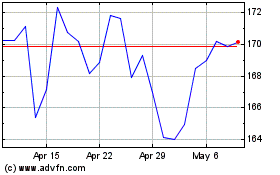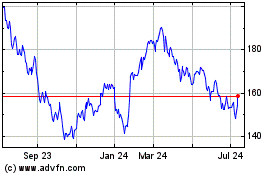Dior Gets Caught Up in China's Latest Map Flap
October 17 2019 - 9:28AM
Dow Jones News
By Julie Wernau
BEIJING -- Christian Dior apologized on Thursday after Chinese
consumers criticized the French luxury brand for using a map of
China that excluded Taiwan.
What set the French luxury brand apart from a long list of
Western brands that have angered Beijing in recent weeks and
months: Dior's map of China didn't appear on a product or a
website, but rather in a closed-door presentation to college
students. Dior is owned by LVMH Moët Hennessy Louis Vuitton.
The outrage over the map and the quick apology from Dior show
how the navigation by brands around issues that can rub China the
wrong way is becoming ever trickier. It followed a major
confrontation between the National Basketball Association and China
that quickly threatened the league's millions of dollars in
business interests in the country.
Unlike other recent flare-ups, which mostly involved
social-media postings, brand web sites or the products themselves,
the Dior incident occurred at a recruiting event at Zhejiang
Gongshang University in the eastern Chinese city of Hangzhou and
then made its way online.
In a video posted online of a question-and-answer session
following the presentation, a female student asks why a map of
China doesn't include Taiwan, a self-governed island that China
considers an inalienable part of its territory. The Dior
representative replied that the picture was too small, implying
that it was hard to show anything except the Chinese mainland. The
student responded: "Taiwan island isn't smaller than Hainan,"
referring to an island province in southern China. Another Dior
representative then added that Taiwan, Hong Kong and the Chinese
mainland together formed "Great China."
That was apparently too little, too late for China's internet
users. The topic "Dior statement" was among the most viewed on
China's Twitter-like microblogging service Weibo on Thursday, with
about 260 million views.
Dior said in a Chinese-language post on its own Weibo account
that it would "seriously investigate" the incident.
"Dior first extends our deep apologies for the incorrect
statement and misrepresentation made by a Dior staff member at a
campus presentation. Dior always respects and upholds the One China
policy, strictly safeguards China's sovereignty and territorial
integrity, and treasures the feelings of the Chinese people," the
company statement read. Dior didn't respond to requests for further
comment.
One social-media user, who called himself " Zhang Xiaoqi loves
sharing," and who identified himself on his personal Weibo account
as an employee of the propaganda department of Zhejiang Gongshang
University, retweeted three posts about the Dior incident.
Commenting on one post claiming that Dior had held presentations
on several campuses but that only students from Zhejiang Gongshang
University had protested, he replied: "This is obligatory. We now
see the red heart of our students."
Underscoring the risks for Western companies seeking to do
business in China and across Asia, film censors in Malaysia,
Vietnam and the Philippines all took aim this week at the animated
movie "Abominable," a co-production between DreamWorks Animation
and Pearl Studio, a Chinese production studio. The film includes
one brief scene portraying a map that shows China's controversial
"nine-dash line," which marks its territorial claims in the South
China Sea.
The NBA received a crash course earlier this month in how
triggering China's anger can engulf a brand after the Houston
Rockets's general manager posted a Tweet in support of Hong Kong
demonstrators. Rockets merchandise effectively disappeared
overnight from stores and e-commerce sites, while broadcasts of NBA
preseason games were canceled. The controversy received widespread
attention, bringing East Asia's fraught geopolitics straight into
Americans' living rooms.
China is on track to become the world's largest retail market by
2021 and is one of the most critical markets for luxury brands. In
recent weeks, brands have been called out for everything from
advertising campaigns viewed by Chinese consumers as sympathetic to
Hong Kong demonstrators to drop-down menus that listed Hong Kong,
Macau or Taiwan as "countries" rather than as a part of China.
Successful Western brands in China have had to move quickly to
keep up with upstart domestic competitors, which has meant giving
people on the ground in China more autonomy. But that strategy can
backfire, says Martin Roll, an independent business and brand
adviser and author of the book "Asian Brand Strategy."
"A very small misstep which is unintentional can completely
backfire and hijack your trajectory for the next five years," he
said.
Apologizing too assiduously carries its own risks, too. U.S.
sports fans and politicians lashed the NBA after its expressions of
regret over the Rockets general manager's tweet, arguing that
Western companies operating in China shouldn't fall in line with
the country's policies simply to protect market share.
--Fanfan Wang contributed to this article.
Write to Julie Wernau at Julie.Wernau@wsj.com
(END) Dow Jones Newswires
October 17, 2019 09:13 ET (13:13 GMT)
Copyright (c) 2019 Dow Jones & Company, Inc.
LVMH Moet Hennessy Louis... (PK) (USOTC:LVMUY)
Historical Stock Chart
From Mar 2024 to Apr 2024

LVMH Moet Hennessy Louis... (PK) (USOTC:LVMUY)
Historical Stock Chart
From Apr 2023 to Apr 2024
